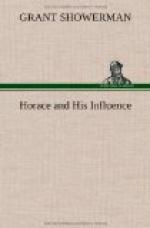His real self will remain among men, ever springing afresh in their words of praise:
N_ot lasting bronze nor pyramid upreared_
B_y princes shall outlive my powerful
rhyme_.
T_he monument I build, to men endeared_,
N_ot biting rain, nor raging wind, nor
time_,
E_ndlessly flowing through the countless
years_,
S_hall e’er destroy. I shall
not wholly die_;
T_he grave shall have of me but what appears_;
F_or me fresh praise shall ever multiply_.
A_s long as priest and silent Vestal wind_
T_he Capitolian steep, tongues shall tell
o’er_
H_ow humble Horace rose above his kind_
W_here Aufidus’s rushing waters
roar_
I_n the parched land where rustic Daunus
reigned_,
A_nd first taught Grecian numbers how
to run_
I_n Latin measure. Muse! the honor
gained_
I_s thine, for I am thine till time is
done_.
G_racious Melpomene, O hear me now_,
A_nd with the Delphic bay gird round my
brow_.
Yet Horace does not always refer to his poetry in this serious vein; if indeed we are to call serious a manner of literary prophecy which has always been more or less conventional. His frequent disclaimers of the higher inspiration are well known. The Muse forbids him to attempt the epic strain or the praise of Augustus and Agrippa. In the face of grand themes like these, his genius is slight. He will not essay even the strain of Simonides in the lament for an Empire stained by land and sea with the blood of fratricidal war. His themes shall be rather the feast and the mimic battles of revelling youths and maidens, the making of love in the grots of Venus. His lyre shall be jocose, his plectrum of the lighter sort.
He not only half-humorously disclaims the capacity for lofty themes, but, especially as he grows older and more philosophic, and perhaps less lyric, half-seriously attributes whatever he does to persevering effort. He has
“N_or the pride nor ample pinion_
T_hat the Theban eagle bear_,
S_ailing with supreme dominion_
T_hrough the azure deep of
air_;”
he is the bee, with infinite industry flitting from flower to flower, the unpretending maker of verse, fashioning his songs with only toil and patience. He believes in the file, in long delay before giving forth to the world the poem that henceforth can never be recalled. The only inspiration he claims for Satire and Epistle, which, he says, approximate the style of spoken discourse, lies in the aptness and patience with which he fashions his verses from language in ordinary use, giving to words new dignity by means of skillful combination. Let anyone who wishes to be convinced undertake to do the same; he will find himself perspiring in a vain attempt.




